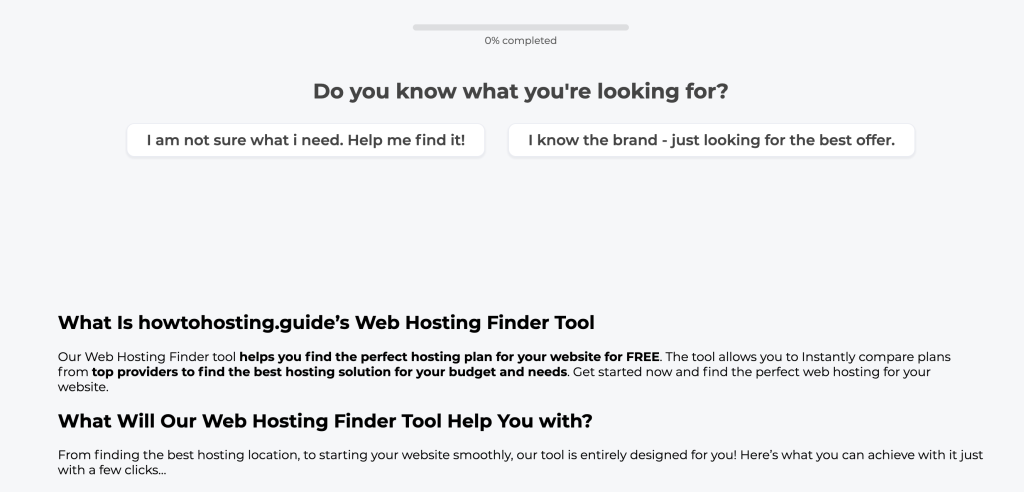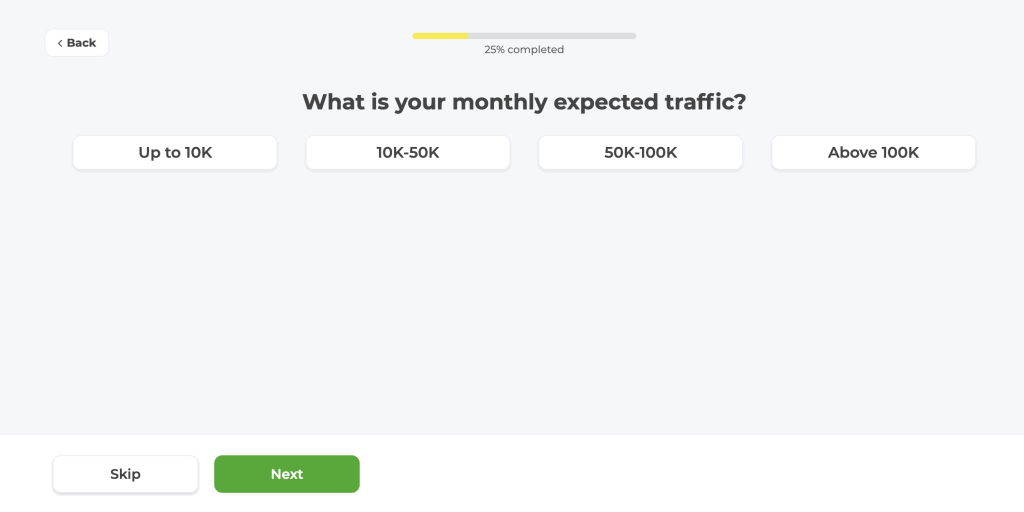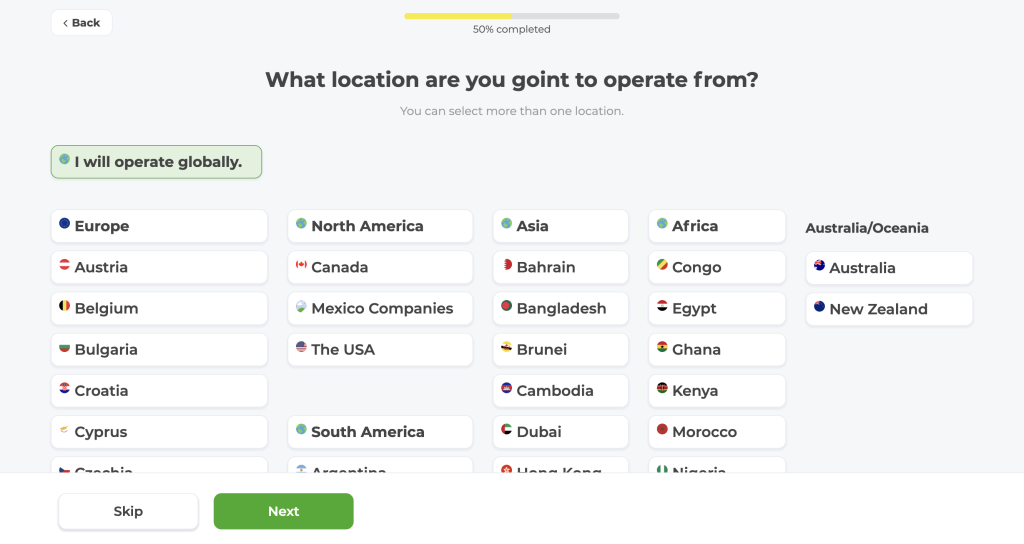On This Page: [hide]
Looking for the best hosting plan for your website’s traffic and budget? Our free hosting finder, which is designed to find the best plan based on anticipated traffic and location targeting, will help you find tailored solutions quickly. Just enter your website’s traffic and your location to get personalized recommendations. Read on to see how it works.
Key Takeaways
The free hosting finder tool assists in selecting suitable hosting plans by analyzing website traffic and best location, providing tailored recommendations.

Understanding the different types of hosting, e.g. shared, VPS, dedicated, and cloud, is crucial for aligning performance needs and budget constraints.
Cost-saving strategies include opting for annual billing, regularly reviewing hosting plans, and utilizing discounts to reduce overall hosting expenses.
How Does the Free Hosting Finder Work?
The free hosting calculator is designed to help you select the most suitable hosting solutions based on your anticipated traffic, targeted locations and CMS. This intuitive tool simplifies the decision-making process by considering your unique needs and providing tailored recommendations.
Using the website cost calculator involves three steps: inputting your website traffic, setting your location, and reviewing the results. These actions help ensure the hosting options are both relevant and feasible. Here’s a detailed breakdown of each step.
Input Your Website Traffic

Start by entering your projected monthly visitor volume. Accurate traffic data helps the calculator find suitable hosting options. If unsure about your traffic, tools like Google Analytics can offer valuable insights, and you can get an instant estimate.
Providing precise data tailors the recommendations to your specific needs, whether you manage a small blog or a high-traffic website.
Set Your Location
Next, set the location:

Get Your Results
After inputting your traffic and location, the calculator analyzes the data and provides recommended hosting plans that match your parameters. Expect tailored suggestions that fit your needs, simplifying the process of finding the best hosting options.
Upon successful verification, the results pages will list hosting plans that best match your criteria. These results offer a clear path forward, ensuring efficient and cost-effective website operation.
Understanding Different Hosting Plans
Selecting the right hosting plan is vital for your website’s performance and budget. The four primary types are:
- Shared hosting
- VPS hosting
- Dedicated hosting
- Cloud hosting
Each serves different needs and budgets. Understanding their differences and benefits is key.
Choosing the right hosting plan involves considering expected traffic, budget, and specific website needs. This section outlines the pros and cons of each hosting type to help you make an informed decision aligned with your business goals.
Shared Hosting
Shared hosting is affordable for new websites and startup e-commerce sites. Popular among those with lower traffic, it typically costs $2 to $10 per month. Multiple websites share a single server, making it economical for smaller sites.
VPS Hosting
VPS hosting offers more resources than shared hosting without the high costs of dedicated hosting. It balances cost and performance, making it suitable for medium-sized businesses anticipating high traffic.
It provides sufficient resources to manage growing demand, ensuring better performance and reliability.
Dedicated Hosting
Dedicated hosting is ideal for high-traffic websites, providing exclusive server resources for optimal performance. It ensures smooth operation under heavy load, making it perfect for large businesses.
Although it comes with higher costs, the investment is justified by the superior performance and control it offers.
Cloud Hosting
Cloud hosting offers several advantages:
- Uses a pay-as-you-go model, allowing users to pay only for the resources they use.
- Provides flexibility to help manage costs while maintaining high performance.
- Is particularly beneficial for e-commerce sites with fluctuating traffic.
- Allows smooth adjustments during peak periods.
Successful e-commerce sites often use cloud hosting to ensure reliability and speed. This scalable solution efficiently handles high traffic by adjusting resources based on demand, making it ideal for businesses with variable traffic.
Key Factors in Choosing a Hosting Plan
Choosing the right hosting plan requires understanding your specific needs to avoid overspending on unnecessary features. Your choice should align with current needs and future growth expectations.
Consider performance and speed, security features, and customer support. A comparison of different providers ensures you pick a plan that matches your performance and budget needs, enhancing the user experience.
Performance & Speed
Hosting quality impacts site speed, user satisfaction, and search engine rankings. Faster websites improve user experience and rank higher on search engines. Plans with optimized server technologies can enhance loading times.
Identifying specific needs like expected traffic and essential resource requirements is crucial when selecting a plan to ensure maximum performance.
Security Features
Security is crucial when choosing a hosting plan. Select one that provides SSL certificates for secure data transfer. E-commerce sites benefit from plans with integrated security features to protect sensitive customer information.
Seek hosting services with robust security tools, including SSL certificates, firewalls, and strong data center protocols. A strong security infrastructure provides peace of mind and enhances your website’s credibility.
Customer Support
Reliable customer support is crucial for swiftly addressing hosting issues. Access to 24/7 support ensures problems are resolved quickly, minimizing downtime.
Effective service support enhances the user experience by providing timely assistance and maintain smooth website operation.
Cost-Saving Tips for Hosting
Many website owners aim to reduce hosting costs without compromising quality. Shared hosting is often the most economical option, with prices from $1 to $15 monthly. However, other strategies can save money on hosting, potentially up to $2100 annually.
Open-source software reduces hosting costs by eliminating proprietary licensing fees. Choosing providers with introductory prices and negotiating can also lead to significant savings.
Take Advantage of Discounts
Many provider offer promotions and discounts that reduce costs and price. To find the best deals, compare providers and look for seasonal offers, holiday sales, or first-time user discounts in pricing.
Bulk purchasing can offer greater discounts when you commit to multi-year plans. Regularly check for updated promotions to ensure you get the best deal.
Opt for Annual Billing
Annual billing often offers substantial savings over monthly payments. These plans usually come with reduced rates, simplifying budgeting and saving money while paying less overall.
This not only saves money but also reduces administrative work, making it easier to manage hosting costs.
Regularly Review Your Hosting Plan
Regularly reviewing your hosting plan ensures it meets your needs as your website grows. Aim to review your plan at least twice a year or annually.
Seek hosting providers that offer regular backups and automatic software updates to prevent data loss. Regular reviews ensure your plan continues to meet your evolving needs.
Optimizing Your Website for Better Hosting Efficiency
Optimizing your website can reduce hosting fees and improve performance. Optimization tools identify areas for improvement, ensuring smooth operation without excessive resource use. Poor optimization can increase hosting costs.
Implementing optimization strategies enhances efficiency and reduces hosting expenses.
Image Optimization
Modern formats like WebP can drastically reduce image file sizes without compromising quality. Optimizing images improves site speed and reduces bandwidth usage, enhancing loading times and minimizing data costs.
This simple technique leads to significant improvements in performance and cost savings.
Content Delivery Network (CDN)
Using a CDN greatly enhances performance and lowers server load by distributing content across multiple servers worldwide.
A CDN improves page load times and reduces the load on the main server, ensuring a faster and more reliable experience for users.
Caching Solutions
Caching enhances loading speeds by storing frequently accessed data for quick retrieval. Methods like browser and server-side caching improve website responsiveness.
Dynamic content benefits from caching techniques that reduce processing time, leading to faster load times and a better user experience.
Real-Life Examples of Successful Hosting Choices
Choosing the right hosting plan is crucial for optimizing performance while staying within budget. Real-life examples show how understanding traffic needs and budget constraints leads to informed decisions, creating a strong connection benefiting business operations.
These examples highlight the importance of selecting a hosting plan that matches your unique requirements.
Small Business Example
A small photography business chose shared hosting to optimize its WordPress plan. This affordable option controlled costs without sacrificing performance, matching its low traffic volume. An annual plan simplified budgeting and reduced administrative work, ensuring reliable hosting without breaking the bank.
As the business grew, it upgraded to VPS hosting to balance cost and performance. This transition provided the resources to handle increased traffic and demand, keeping the website fast and responsive. Strategic hosting choices helped the business achieve its goals cost-efficiently.
E-commerce Site Example
An e-commerce site anticipated high traffic during sales events and campaigns. Using the website cost calculator, the owners predicted traffic volume and chose scalable VPS hosting, ensuring seamless customer experiences during peak hours and preventing site crashes.
For better scalability, the site implemented cloud hosting, allowing dynamic resource allocation to handle fluctuating traffic and ensuring a reliable net connection. This flexible solution proved beneficial during high-traffic periods like holiday sales, ensuring reliability and speed.
Regularly monitoring traffic and adjusting hosting resources optimized performance and ensured user maintenance, contributing to the site’s success.
Summary
Choosing the right hosting plan is a crucial step in ensuring your website runs smoothly and efficiently. By using our free traffic and budget calculator, you can find tailored hosting solutions that match your specific needs. Understanding the different hosting options, considering key factors like performance, security, and customer support, and implementing cost-saving tips can significantly enhance your website’s performance while keeping costs under control.
We hope this guide has provided you with the insights and tools needed to make informed decisions about your hosting plan. Remember, the right hosting choice can make all the difference in your website’s success. Start using the hosting calculator today and take your website to the next level!
Frequently Asked Questions
How does the free hosting calculator work?
The free hosting calculator analyzes your website traffic and budget to recommend suitable hosting solutions. By inputting relevant data, you receive personalized hosting plan options that best fit your needs.
Why is it important to input accurate website traffic data?
It is essential to input accurate website traffic data as it enables more effective recommendations for hosting options. Tools such as Google Analytics can assist in achieving precise traffic estimates.
What are the benefits of setting a budget when choosing a hosting plan?
Setting a budget is essential as it enables users to identify hosting plans that are financially feasible while ensuring they do not compromise on vital features. This approach not only saves money but also streamlines the decision-making process.
How can I save money on hosting costs?
You can save money on hosting costs by utilizing discounts, choosing annual billing, and periodically reviewing your hosting plan to align it with your needs. Implementing these strategies will effectively reduce your overall hosting expenses.
What hosting plan should I choose for a high-traffic e-commerce site?
For a high-traffic e-commerce site, it is advisable to select a VPS or cloud hosting plan to ensure scalability, reliability, and optimal performance during traffic spikes. These hosting solutions will adequately support your website’s needs.
